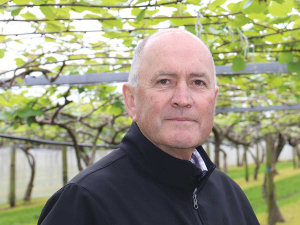EPA remains committed to deliver improved outcomes
OPINION: At the end of my first year as chair of the Environmental Protection Authority (EPA), I have been reflecting on the progress made in the time I have been in the role.
 HortNZ chair Barry O’Neil is among many who are highly critical of the present so called ‘competitive science funding model’.
HortNZ chair Barry O’Neil is among many who are highly critical of the present so called ‘competitive science funding model’.
There's an urgent need for a greater focus on science in the food and fibre sector.
HortNZ chair Barry O’Neil says the New Zealand primary sector has developed from the science that was done in the last century, which has enabled our livestock sector – and latterly the horticultural sector – to grow and thrive. But he’s concerned that, in recent times, there has been a loss of focus on using science to support the challenges that lie ahead for the sector.
“I want to see far greater support from the Government and our science bodies to work in partnership with our food and fibre sectors – including the breeding programme for plant and horticultural varieties,” he told Rural News.
“Such a strategy would ensure that we are ahead of the world when it comes to our ability to put into the fruit bowl of consumers, varieties that taste the best.”
O’Neil hopes that in 2021 there will be a greater focus on those breeding programmes that are important when it comes to climate change.
“The goal must be to ensure that we have varieties that are more resilient to a warming climate or the pest pressure that results from the changing climate,” he says.
O’Neil points to the recent initiative by Zespri and Plant and Food Research to set up a special joint venture entity to focus on speeding up the kiwifruit plant breeding programme.
He says Zespri has the critical mass to do this, but that smaller groups don’t have this and rely on largely government-funded science supported in part by industry.
He says NZ definitely needs that connection with science supporting economic development.
O’Neil is among many who are highly critical of the present of the so called ‘competitive science funding model’, which sees CRI’s, universities and private science institutions ‘bid’ for pockets of funding, some quite small. The system is now run by MBIE after earlier being run the Foundation for Research Science and Technology.
For many years, scientists have been frustrated by the system and its outcomes and believe that the primary sector is poorly served by the system.
Rural News understands that many social science projects are being supported under this regime, but with little emphasis on practical science that could really drive economic growth.
Most CRI’s have large teams of highly-qualified, senior scientists and administrators working full time to process and lodge bids.
“Our scientists are spending half their bloody time developing funding bids of which about 90% don’t get supported. What a waste of time for our clever scientist being stuck in a conundrum like this where they have to spend half their valuable time putting in science proposals that often go nowhere,” O’Neil says.
“There is no dedicated food and fibre pot, the system is so complex and convoluted and has lost a sense of reality of what NZ needs from our science system.”
Despite logical protests like those of O’Neil and others, the system remains unchanged and unliked by many in the primary sector.
Agriculture and Forestry Minister Todd McClay is encouraging farmers and growers to stay up to date with weather warnings and seek support should they need it.
The closure of SH2 Waioweka Gorge could result in significant delays and additional costs for freight customers around the Upper North Island, says Transporting New Zealand.
OPINION: The year has started positively for New Zealand dairy farmers and things are likely to get better.
Ministry for Primary Industries (MPI) Director General Ray Smith believes there is potential for an increase in dairy farming in New Zealand.
New Zealand's new Special Agricultural Trade Envoy, Horowhenua dairy farmer, company director and former Minister of Agriculture, Nathan Guy says the Free Trade Agreement (FTA) with India is a good deal for the country.
New figures show dairy farmers are not only holding on to their international workforce, but are also supporting those staff to step into higher-skilled roles on farm.